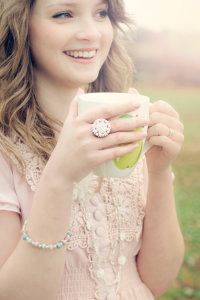 We’ve all been guilty of taking pictures with our eyes closed. Just go crazy, go on a shooting spree and see what happens. See what happy mistakes you can pawn off as well-thought out, purposefully captured portraits. Here are 6 ways you can identify yourself as a luck photographer:
We’ve all been guilty of taking pictures with our eyes closed. Just go crazy, go on a shooting spree and see what happens. See what happy mistakes you can pawn off as well-thought out, purposefully captured portraits. Here are 6 ways you can identify yourself as a luck photographer:
- You take way too many pictures. A one hour session results in 500 shots to sort in your computer
- Your sessions take hours longer than they need to
- You feel panicky, nervous and out of control while you’re shooting
- You can’t explain to someone later on how you made a portrait or the settings you chose
- You either shy away from manual all together or you ‘wing it’ and take the same shot over and over with different settings ‘just in case’
- Your clients are confused as to why they spent hours with you, witnessed you taking a bajillion photos but they only ended up seeing 20 of them (note: clients will ask this anyway, but the less you rely on luck, the less they will ask)
I have been guilty of all of the above, and not even that long ago. Believe it or not, I’ve been a very good fake at times. In the beginning, I posted images that had rave reviews from readers inspite of the fact that they were just lucky shots that I couldn’t recreate if I wanted to. There are a few reasons why this can be dangerous to a photographer who is charging for their sessions:
- Your clients have gone to your website for a product but when they come to you for their session, you won’t be able to produce the same product for them.
- Following on from the above, some of you might know of the story of Jesus cursing the fig tree. He was enticed by the leaves of the tree, but when he approached it, there was no fruit. He cursed it and it died. Being a haphazard photographer is like a tree of leaves enticing clients who later find that there isn’t actually any fruit. A business built on these principles can’t last.
- You will smash your own confidence if you rely on luck. You will feel out of control and deep down inside, you’ll know that it wasn’t really YOU creating the images.
When I look back, I can see that I have learned many things from my lucky shooting days. I learned about composition. I learned about self restraint and, most importantly, I learned how to stop shooting for luck and how to start taking pictures on purpose. Here are the things I wish I knew back then to get started sooner:
- Learn Light – I can’t just call myself an ‘available light photographer’ and claim to only shoot in natural light to get around learning about lighting. When I wanted to stop being at the mercy of the sun, the location, the time of day, I buckled down and learned the (surprisingly basic) things you need to know to take control of the light. Someone once said, “I’m an available light photographer. My Speedlite is available.”
- Learn Your Camera - This is an obvious one, but needs to be said: learn how your camera sets exposure and why. Aperture, ISO, shutter speed and white balance. Force yourself to shoot in manual (or one of the in-between modes likeaperture or shutter priority modes.) and see what the different dials actually do.
- Learn Posing – I had to stop taking pride in being the anti-posed photographer and start actually learning about the art of posing subjects (particularly children) so that I could stop shooting like a maniac, chasing them for a square mile and just waiting for them to stop and look at me, all the while filling up a 16gb memory card and giving myself a helluva lot of sorting to do later on. I bought and utilized posing guides from Skye Hardwick to take control and make portraits rather than just take pictures.
- Try Bracketing – When you’re just starting out and you want to make sure to nail your exposure, bracketing can be a super useful tool. Before discovering it, I would take three different photos all while quickly moving the dials with my thumb to alter the shutter speed or aperture to get three exposures for one image. With bracketing, you can take three photos at once, all of different exposures and then choose later on which one is right for your image.
- Have Restraint – When I shoot now, I probably trash only 10-15% of my images (in contrast to 80% in the beginning) and only for reasons like blinking or a cat running in the way. I don’t click click click the shutter. I set up the shot, take control of the light, capture the image and when I’ve got it, I move on to another. I think there must be such a thing as shutter addiction. It’s so satisfying to hear the shutter clamp down and know that you have actually captured something: that you have harnessed the light and made it yours.
No photographer just woke up great. It’s been a long haul to get where I am and I recognize that I’ve got a long way to go. You never get to a point where you know 100% of everything there is to know about photography and that’s what makes it such an exciting hobby or career.

